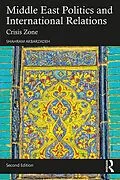As featured on BookAuthority's list of best International Relations books to read in 2024.
Continuing civil wars and humanitarian crises, coupled with a changing geopolitical dynamic, highlighted by increased Russian and Chinese presence in the Middle East, call for new thinking. What happens in the Middle East has major global repercussions.
This second edition of the ground-breaking textbook Middle East Politics and International Relations: Crisis Zone provides a comprehensive overview of contemporary Middle East politics. The book traces the roots of recent events across the region's modern history, enabling readers to appreciate both the significance of such events and the importance of history in influencing their outcomes. Structured chronologically, with updated stand-alone chapters containing history, context and contemporary analyses, this edition examines a series of interconnected themes and issues, including external intervention, political manifestations of Islam, the role of political authority, nationalism, self-determination and human rights.
The book provides a valuable teaching tool, both in its content and structure. Students will gain a deeper understanding of a changed Middle East and the evolving role of states and non-state actors in the region.
Autorentext
Shahram Akbarzadeh is Research Professor of Middle East and Central Asian Politics and held the prestigious ARC Future Fellowship (2013-2016). He is Deputy Director (International) at the Alfred Deakin Institute for Citizenship and Globalization, Deakin University, Australia.
Kylie Baxter was formerly a Lecturer in Islamic Studies at Asia Institute, University of Melbourne, Australia.
Klappentext
New developments require new thinking for students of the contemporary Middle East. Continuing civil war and humanitarian crises, coupled with a changing geopolitical dynamic through increased engagement with Russia and China, has caused immense regional and global repercussions.
This second edition of the ground-breaking textbook Middle East Politics and International Relations: Crisis Zone provides a comprehensive overview of contemporary Middle East politics. The book traces the roots of recent events across the region's modern history, enabling readers to appreciate both the significance of such events, as well as the importance of history in influencing their outcomes. Structured chronologically, with updated stand-alone chapters containing history, context, and contemporary analyses, this edition examines a series of interconnected themes and issues, including external intervention, political manifestations of Islam, the role of political authority, nationalism, self-determination, and human rights.
The book provides a valuable teaching tool, both in its content and structure. Students will gain a deeper understanding of a changed Middle East and the evolving role of states and non-state actors in the region.
Inhalt
1. Historical Context
2. The formation of the state of Israel
3. The Arab-Israeli wars
4. Palestinian politics: The failure of the 'peace-process'
5. Pan-Arabism and Islamism
6. The Iranian Revolution and pan-Shi'ism
7. Playground of the Superpowers
8. The US-led War on Terror
9. The Arab Uprising
10. The Syrian War
11. The Islamic State
12. Iran-US Relations and the Nuclear Deal
13. Shifting geopolitics in the Middle East
